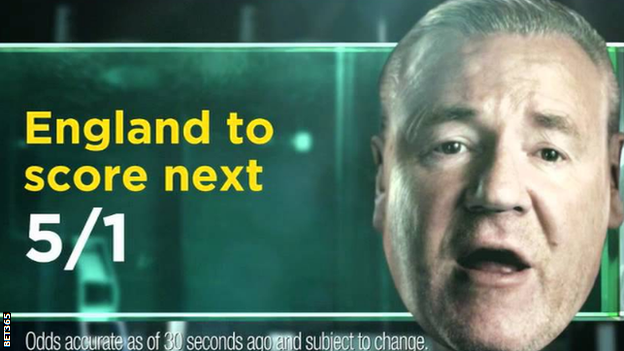Gambling chiefs confirm 'whistle-to-whistle' television sport advertising ban
- Published

Gambling chiefs say they are "responding to public concerns" after confirming plans to effectively ban television betting adverts during pre-watershed live sport.
Last week, BBC Sport reported Britain's biggest gambling companies had agreed a "whistle-to-whistle" advertising ban.
The Industry Group for Responsible Gambling (IGRG) has now confirmed the ban, which will begin in 2019.
It follows political pressure about the amount of betting advertising on TV.
No betting adverts will now be shown during live sport coverage before 21:00 in the UK from five minutes before the event begins until five minutes after it finishes,
Horse racing and greyhound racing are exempt from the restrictions because of the commercial importance of gambling on their viability.
It is understood the ban will include events that begin before the watershed but end after it.
It will also include re-runs of sporting events and highlight shows before 21:00.
"We believe that this is itself a watershed moment as we strive to provide the ever safer gambling environment which gambling consumers and the wider public expect, and which is so important to the future success and sustainability of our industry," IGRG chair John Hagan said.
"Today the gambling industry is responding positively to public concerns about the amount of gambling advertising on television before the watershed."
How has this come about?
More than 90 minutes of adverts were shown during this summer's football World Cup and anti-gambling campaigners say sport's use of adverts "normalises" betting.
There are also fears it contributes to the rise in the amount of problem gamblers - with a Gambling Commission report suggesting 430,000 Britons can be described as such - and helps fuel underage gambling.
The Remote Gambling Association (RGA), made up of Britain's biggest betting companies including Bet365, Ladbrokes and Paddy Power, voluntarily agreed the ban, which was first reported last week.
That proposal needed final ratification from the IGRG, a collective body of the five gambling associations, which has now been given.
Hagan said the ban will "drastically reduce the amount of gambling advertising on television and they complement the strict controls that already govern gambling companies around advertising on digital platforms".
What has the reaction been?
Jeremy Wright, the secretary of state for digital, culture, media and sport, said the ban is a "welcome move".
He added: "I am pleased that the sector is stepping up and responding to public concerns.
"It is vital children and vulnerable people are protected from the threat of gambling-related harm. Companies must be socially responsible."
However, Stephen van Rooyen, chief executive office of broadcaster Sky in the UK and Ireland, criticised the ban and suggested betting companies will instead spend more money in other areas of advertising.
"Yet again, the gambling industry are ignoring the fact they spend five times more on online marketing than they do on TV," he said.
"By cutting TV ads, they'll simply spend more online, bombarding people's smartphones, tablets and social media feeds with even more gambling ads.
"A proportionate and responsible limit to gambling advertising across all media is the right thing to do."
In September, Labour called for the introduction of a betting advertising ban during live sporting events and deputy leader Tom Watson said on Thursday: "This is an important first step in recognising that the proliferation of gambling adverts has got completely out of hand.
"It was imperative for the industry to accept there is a problem and they have done that today.
"The next step will have to be addressing the gambling adverts that children and vulnerable problem gamblers see online."
Gambling Commission chief executive Neil McArthur said: "Today's announcement is a significant step forward in demonstrating that this is an industry that is starting to listen to its customers and the wider public."
Analysis
BBC sports news correspondent Richard Conway
The gambling companies have taken decisive action in voluntarily banning betting adverts before the 21:00 watershed.
Is it enough? Many have pointed to the amount the bookies spend with online marketing. Shirt sponsorship of teams, perimeter advertising and putting their name to league and cup competitions will also be unaffected.
Nevertheless, the measures restricting TV ads have been welcomed by politicians and the public alike.
Perhaps conscious of the way government acted in eventually legislating to reduce the big stakes of fixed odds betting terminals in bookmaker shops, the industry has made the first move.
Their hope is that they'll be seen as responsible partners - and stave off present or future governments imposing any restrictive measures upon them.
- Published6 December 2018
